- Home
- T.A. Barron
A Wizard's Wings Page 11
A Wizard's Wings Read online
Page 11
Stangmar, still watching her intently, said nothing.
“It can heal a broken spirit,” she went on, stepping a little closer. I shot her a worried glance, but she ignored me. “Here now, take it. Use it for yourself.”
Hesitantly, his fingers stirred, as if they were deciding what to do. Then his hand lifted, and his whole arm. He reached toward the glowing sphere.
“Please,” she implored. “Use it to restore the man you once were.”
Suddenly, Stangmar’s face went rigid again. His mouth pinched with pride. With a sharp swipe of his hand, he struck the Orb, sending it hurtling over the fire coals. It struck the weathered trunk of the oak and burst into thousands of shards. A flash of orange light exploded, hovered in the air for an instant, then faded away into nothingness.
Utterly speechless, Rhia stared at the shards, sprinkled across the oak’s burly roots. Lleu darted to her side, as did Scullyrumpus. They stood in silence, gawking at the remains of the Orb of Fire.
I pounded my staff on the ground. “You destroyed it!”
“Just as you, boy, destroyed my realm! I curse the day that woman ever brought you back to this isle.”
With that, he took a stride toward Ionn. The great stallion’s tail swished sharply, and his ears angled back. He reared, chopping at the air with his hooves, before galloping some distance away. Shaking his mane, he stood with his head high, black coat glistening in the early morning sun.
“All right, then,” Stangmar grumbled. “The horse shall be yours.” His frown deepened. “But the final victory shall be mine.”
From his pocket, he hurled something into the coals of the fire. A sudden burst of smoke, thick and dark, erupted. Like a heavy blanket, it enveloped us, choking our throats and searing our eyes, tongues, and nostrils. Coughing violently, tears pouring down our cheeks, we stumbled away from the smoke.
At length, our coughs subsided. The smoke dissipated, and we started to breathe normally again. Ionn whinnied and trotted over to my side. He butted me with his nose, and I stroked his long jaw. Then I looked around. Stangmar had vanished—along with Coella.
“She’s gone,” I fumed. “The mare is gone.”
“She’s not all that’s gone.” Somberly, Rhia kicked at a few shards, all that was left of the Orb. Hoarsely, she whispered, “I never did learn how to use it.”
I gave her a hug, hoping to comfort her. “It’s not your fault.”
“It is,” she said sadly. “I should never have shown it to him.” Thoughtfully, she pursed her lips. “Even so, do you know what’s strange? I’ve dropped it before, even fallen on it once or twice. But it never broke, or even cracked. It’s almost like . . . well, like it was ready to break just now.”
I touched the place on her belt where the globe had ridden for so long. “Wish I could bring it back for you,” I confessed. “But if there’s any magic that can do that, I don’t know it.”
She swallowed. “For a moment there, I really thought he’d use it to heal himself.”
I squeezed my staff. “To heal that man would take more magic than the Orb ever had.”
Scullyrumpus trudged over to the shards, chattering to himself in disbelief. For a moment he pawed through the pieces, working his way among the twisted roots. Finally, he quit, apparently convinced that the treasure had truly been destroyed. Ears drooping, he returned to Rhia and climbed up to her shoulder. Gently, he wrapped himself around her neck, embracing her like a collar of fur.
“We’ve got to warn Mother,” I declared. “She has to stay where we left her, in that little village. It’s about the last place Stangmar would think to look for her.”
“You heard her, though,” Rhia countered. “She’ll be leaving there tomorrow.”
“Then we’ll have to get word to her today.” I scratched my chin. “And there’s another problem. Stangmar might try to follow you or me, so it shouldn’t be one of us who warns her.”
In unison, we turned toward Lleu. I sank to my knees to face him. “Could you do it, lad? Could you run back to the village today?”
Uneasily, he tugged on his sandy hair. “I could do it, master Merlin, if ye needs it done.” His gaze fell. “Truly though, I don’t really wants to.”
“Please,” I implored. “It’s to help Elen, the good woman who took care of you.”
Slowly, he nodded.
“Now, you must get there before nightfall. And you must tell her to stay in that same village until we come for her. All right?”
“Yes, master Merlin.”
I gave him a hug, patting his small back. “Thanks, lad. Now have yourself a drink from the rivulet before you set off.”
As he stepped over to the bank, I rose and fetched the woolen scarf from the moss where he’d slept. “Oh, Lleu,” I called. “Don’t forget this.”
He looked up from the water’s edge, his face dripping wet. Seeing the scarf, he beamed. He padded back over to me, and stood still as I wrapped it around his small neck.
“There,” I pronounced, giving him another hug. “On your way now. Oh—and Lleu.”
“Yes, master Merlin?”
I gazed at his muddy brown eyes. “You be careful.”
He lingered a few more seconds, his tongue working inside his mouth as if he longed to say something. But no words came. Hesitantly, he turned and started running south across the stubbly grass of the plains.
For a while I watched him, then felt Rhia push something under my arm. It was the vest, its woven astral flowers aglow in the sunlight.
“You’ll be needing that,” she declared.
“So will you,” I objected. “You should keep it.”
She shook her head. “No, no, Mother gave it to you. And besides, it’s only fair, since I’ll be taking your horse.”
My eyebrows jumped in surprise.
She glanced over at Ionn, who was walking toward the old oak. The muscles of his legs and back gleamed darkly, rippling as he moved. “That’s right, isn’t it?”
“Of course,” I agreed. “You’ll have more ground to cover, and more need for speed.” With a grin, I added, “It just always amazes me when you have my ideas before I do.”
She grinned back. “They’re usually your best ideas, though.”
“Too true.”
She took my hand. “Where will you start to look for that warrior?”
“In that village to the north, the one the old fellow mentioned. What was it? Yes—Caer Darloch.” I inhaled the crisp morning air and blew out a frosted breath. “If that Sword Arms character is truly searching for me, it won’t be long until I find him. I only hope it’s before he’s harmed anyone else.”
Rhia curled her forefinger around my own. “Find him, Merlin. Do what you must to stop him. Then meet me at the circle of stones. Don’t fail me, all right?”
“I won’t fail,” I promised. Fixing her with my gaze, I declared, “Nor will you.” One last time, I studied her face—so sensitive and aware and yet, at the same time, so bold and unpredictable. “Ride well, now. Ride as if you had wings.”
14: SNOWFALL
Snow came suddenly. Even as Rhia and I parted, the sun vanished behind a thick mesh of clouds, and the first flakes began falling. Large and unwieldy, they drifted down relentlessly, coating the upper limbs of the oak and filling the deep grooves of its trunk. In a moment’s time, the tree’s twisted roots became nothing more than ridges of white upon the ground.
I tramped northward, keeping just outside the edge of the forest, in the hope that less snow would accumulate at the base of the trees. I knew from experience the difficulties—and dangers—of trekking through drifts out on the open plains. Though I seemed to be heading into the worst of the storm, I worried about Lleu, traveling south across unprotected grassland. Would he lose his bearings in all that whiteness? How long would his bare feet last in an onslaught of snow?
Just ahead of me, a hemlock bough snapped, releasing a cloud of shimmering white crystals and dumping a mound on the ground. As
I stepped across, my boots crunched on the frozen mass. And my thoughts turned to another set of worries: where to find this sword-armed warrior. Clearly, he expected me to seek him out, which was why he’d announced his challenge to the old man—and, no doubt, to others. What if, by the time I reached Caer Darloch, he’d already left? Or maybe he hadn’t intended to stop there at all, just to pass by on his way to the rising plateaus farther north, home to Urnalda and her dwarves.
The mere thought of Urnalda chilled me deeper than the frosted air. As much as I wanted the dwarves to join Fincayra’s ranks at the circle of stones, I hoped that Rhia wouldn’t have to deal with their treacherous enchantress. She would have more than enough difficulties already in trying to win over the canyon eagles and the others!
Snowflakes continued pouring down as I reached the end of the trees. The instant I left their cover and started tramping across the exposed plains, a biting wind struck, piercing even my thickly padded vest. Before me, the land had already transformed from rusty brown dappled with gray to a uniform blanket of white. Drifts gathered, lifting above the ground like a succession of frozen waves.
The wind howled fiercely, freezing my fingers to my staff. Meanwhile, the frosty clouds of my breath froze the skin of my cheeks as well as the stubbly hairs on my chin. I wished, as I had often before, that I could grow a beard. Yes, a great thick one that could shield my face from such a storm.
How could I battle anyone in such conditions? No matter. I would find that warrior, that murderer of children, wherever he was. And put an end to his brutal attacks. Forever.
Spying a gnarled apple tree, so old that several of its snow-covered branches drooped down to the ground, I decided to seek a moment’s shelter from the wind. As I approached, I noticed a small glint of rusty red on a higher branch—an apple, shriveled and dry, but possibly edible. Climbing under the boughs, I knocked it loose with my staff, sat down, and took a small bite.
Tough it was, and bored out by worms. But a hint of tart apple flavor burst in my mouth, reminding me of the fragrant spring that now seemed so far away. Apple blossoms, new green leaves, fresh blue gentians, tiny strawberries exploding with sweetness . . . How long had it been? Legs crossed, I gnawed on the fruit, wondering whether springtime would ever come again to this landscape.
For now, the world was filling up with snow. When I finished the meager apple, I discarded the core. It landed on the head of my shadow, barely visible on the ground through the shadows of the interlaced boughs. Easily miffed as ever, my shadow gathered itself and flung the core back at me, barely missing my nose.
“Oh, do behave,” I scolded. “My nose may be large, but it’s not a target.”
The shadow placed its hands on its hips, rocking its head back and forth as it scolded me in return.
“All right, then, I apologize.” I shook my own head. “Sometimes, though, I wonder how I ever endure you! Really. You can be as testy as, well, as . . .” I caught myself, grinning guiltily. “As me.”
As the shadow shook with justifiable mirth, I reached for my leather satchel. From its pouch I pulled out the feather from Trouble’s wing. Twirling it slowly between my thumb and forefinger, I tried to imagine what his life was like in the Otherworld of the spirits. Surely he soared and swooped and dived for hours in that world of mist, as he had once loved to do in this world. Did he fly at Dagda’s side, perhaps, or wherever the winds chanced to take him? And who did he screech at, in his regular fits of rage or passion, now that I was no longer by his side?
Giants’ bones, how I missed him.
Wistfully, I put the feather back in the pouch. Then, despite the howling wind, I ducked under the branches and stepped out into the snow. Grateful more than ever for my mother’s vest, I pushed through a mounting drift. For a brief moment, I paused, gazing back at the tree, knowing someone must have planted it long ago. That had been an act of faith: in the future, in the children who would one day reap its harvest. Grimly, I slid my staff under my belt and set off.
Tucking my hands under my armpits for warmth, I trudged through the gathering snow. My best chance to find the village, I knew, was to stay alert for any signs of water—a stream, a tarn, or a branch of the River Unceasing. Guessing at the sun’s position behind the clouds wasn’t easy, but I did my best to keep myself on a northerly bearing. Otherwise, in this swirling storm, I could easily spend the rest of the day roving in circles.
Snow matted my hair and slid down the back of my neck into my tunic, but I paid no heed. What mattered now was finding Sword Arms. Before long, my toes grew stiff and numb from the cold. Slender icicles started to dangle from the hair over my ears. Still, I pressed on.
Suddenly I stepped into a hip-deep hole. Face first, I toppled forward, taking a mouthful of snow. Flailing about to extract myself, I noticed a subtle line of depression at the edge of the deeper snow. A stream! I had, unwittingly, stepped right off the bank.
As I clambered back onto the higher ground, wiping the snow off my face, I began following the path of the stream. After a while it grew noticeably wider, so that the snow didn’t fill the whole channel. At the same time, the storm itself began to slacken. The flakes became sparser, and the wind blew less fiercely.
Then I smelled smoke. Whether it came from a single cooking fire or a multitude of hearths, I had no idea. But I pushed onward, staying with the route of the stream. In time I noticed a faint gray haze in the distance. As the snow lightened further, I spied the outline of a thatched roof. Then another, and another. It was, indeed, a village.
It consisted of more than a score of homes, sturdier and tidier than the huts of Caer Aranon. I saw pens for sheep, goats, and chickens, some of which were already venturing out of their shelters and gamboling in the snow. Many of the houses had porches and window boxes, and a few offered swinging seats for relaxation. Beyond doubt, this was one of the prosperous farming communities at the southern border of the dwarves’ realm. But was it Caer Darloch?
I approached the common, a wide square between several of the largest houses, including one that held a blacksmith’s forge. Suddenly I heard a sound that struck me with dread. A wailing child! I spun around to find the source. There, to my relief, stood a mother on her porch, taking off her child’s leggings, which were soaking wet from snow. The child, shrieking miserably, looked red faced and teary, but otherwise quite unharmed.
At that moment, a gruff voice addressed me. “What’s yer business, stranger?”
Turning around, I faced a stocky, dark-haired man with a ruddy complexion. In one hand, he held a spear—though he held it upright, like a staff. Seeing its gleaming tip, I felt relieved it wasn’t pointed at me. Not yet, at any rate.
“Well?” he barked, eyeing me suspiciously.
“Is this Caer Darloch?” I asked.
“First tell me yer business.”
“My business is yours, as well,” I replied, brushing some snow off the sleeve of my tunic. “I need to know if you’ve seen any signs of a warrior with no arms, but sword blades instead.”
The man raised his dark eyebrows. His face twisted. For an instant he looked as if he were going to be ill. Then, all at once, he released a huge guffaw. He began laughing raucously.
“A warrior, ye say? Without arms? Hoohooha-ha-ha!” He slapped his thigh. “Oh, ho-ho-hee, that’s a precious one, hoho.”
I scowled at him, wiping some snow off my tunic collar. “It’s no laughing matter. He has swords instead of arms. He’s a murderer, a maimer of children.”
Again the burly fellow slapped himself in mirth. “A great lot o’ ha-ha-harm he can do widdout any arms! Hahaha, hoohoo.”
“I speak truth!”
“Then yer truth, haha, heehee, is precious funny.”
“Not at all!” I countered, my rage rising. “Don’t you understand? Every orphan—every child—is in danger! Have you no heart, man?”
“Ya, ya,” he replied with a chortle. “An’ I also have arms.” He fell again into hysterics. “Hoho, th
at’s precious. Arms, heart, hoohoohoo.”
My patience gone, I pointed at the head of his spear, carved from black obsidian. “No doubt you’ll think it funny, too, when Rhita Gawr attacks this village and skewers you with that very spear.”
The man’s face grew suddenly stern. “Now yer no longer funny.” He lowered the spear, pointing it squarely at my chest. “An’ no longer welcome.”
“Who are you to turn me away?” I demanded. “I need to speak with your village elders, whoever is in charge. Someone with a grain of sense in his head.”
His arms flexed as he squeezed the spear. “I am Lydd, guardian o’ Caer Darloch.” He jabbed the spear, grazing my tunic. “An’ I am tellin’ ye to leave.”
Despite the fact that my fraying garb and snow-matted hair made me look more like a vagabond than a wizard, I replied, “And I am the one called Merlin! I command you to take me to your elders.”
His face flushed. “Merlin, is it? Ye think ye can pass yerself off as a mighty wizard just by stealin’ his name? Why, stories have it the real Merlin can dispatch a troop o’ goblins with naught more than a flick o’ the wrist!” He pushed the spear point closer until it pressed against my ribs. “Why, yer just a beggar, an insultin’ jester. Be gone, I say! Or yer blood’ll paint the snows o’ this common.”
Grinding my teeth, I stared straight at him. “Not my blood, but yours.”
With a flick of my wrist, I sent a bolt of blue fire into the head of his spear. He shouted, leaped backward, and dropped the weapon. Aghast, he watched as the obsidian point melted completely away, sizzling on the snow. A moment later, all that remained was a splotch of black on the white-coated ground.
He lifted his head, his eyes filled now with terror. “So ye really are . . .”
“Merlin. Now tell me. Are there any orphan children about?”
He opened his mouth, then closed it tight. He started to back away, one step, then another. I raised my hand to stop him—and he turned and bolted off, his boots pounding in the snow.
“Come back!” I called.

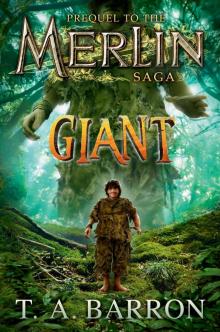 Giant
Giant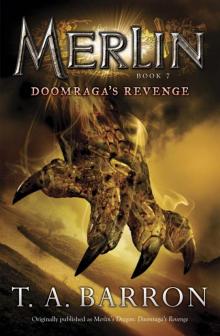 Doomraga's Revenge
Doomraga's Revenge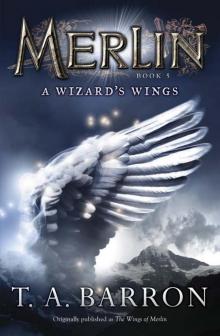 A Wizard's Wings
A Wizard's Wings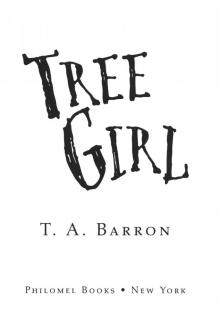 Tree Girl
Tree Girl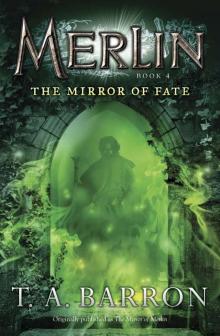 The Mirror of Fate
The Mirror of Fate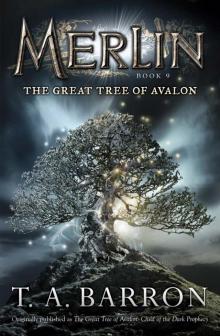 The Great Tree of Avalon
The Great Tree of Avalon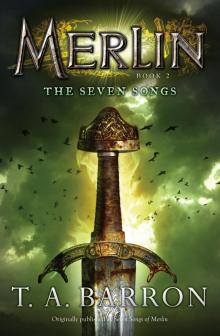 The Seven Songs
The Seven Songs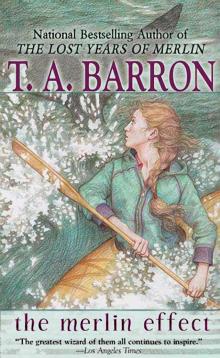 The Merlin Effect
The Merlin Effect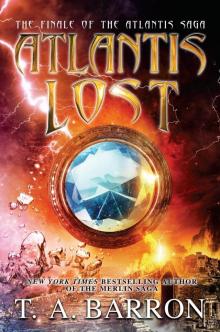 Atlantis Lost
Atlantis Lost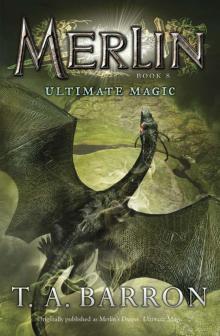 Ultimate Magic
Ultimate Magic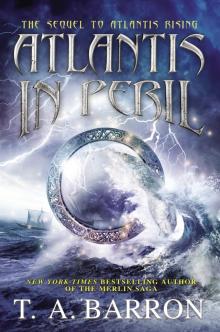 Atlantis in Peril
Atlantis in Peril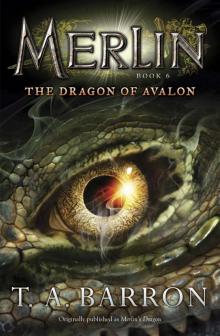 The Dragon of Avalon
The Dragon of Avalon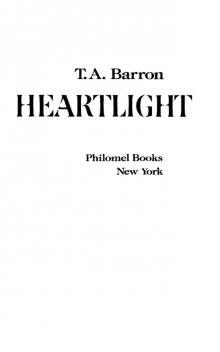 Heartlight
Heartlight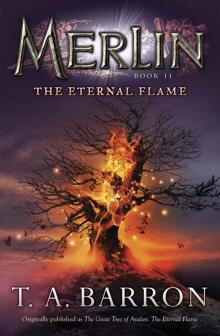 The Eternal Flame
The Eternal Flame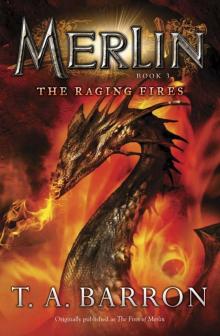 The Raging Fires
The Raging Fires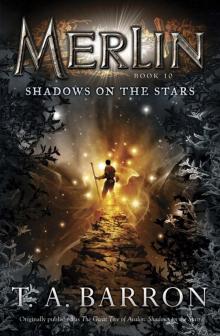 Shadows on the Stars
Shadows on the Stars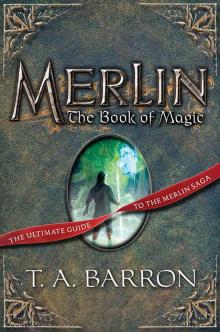 Merlin: The Book of Magic
Merlin: The Book of Magic The Lost Years
The Lost Years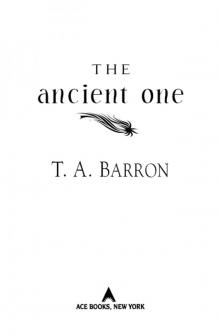 The Ancient One
The Ancient One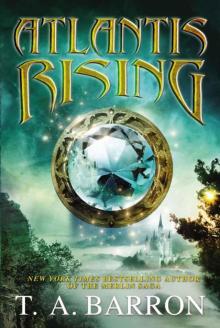 Atlantis Rising
Atlantis Rising